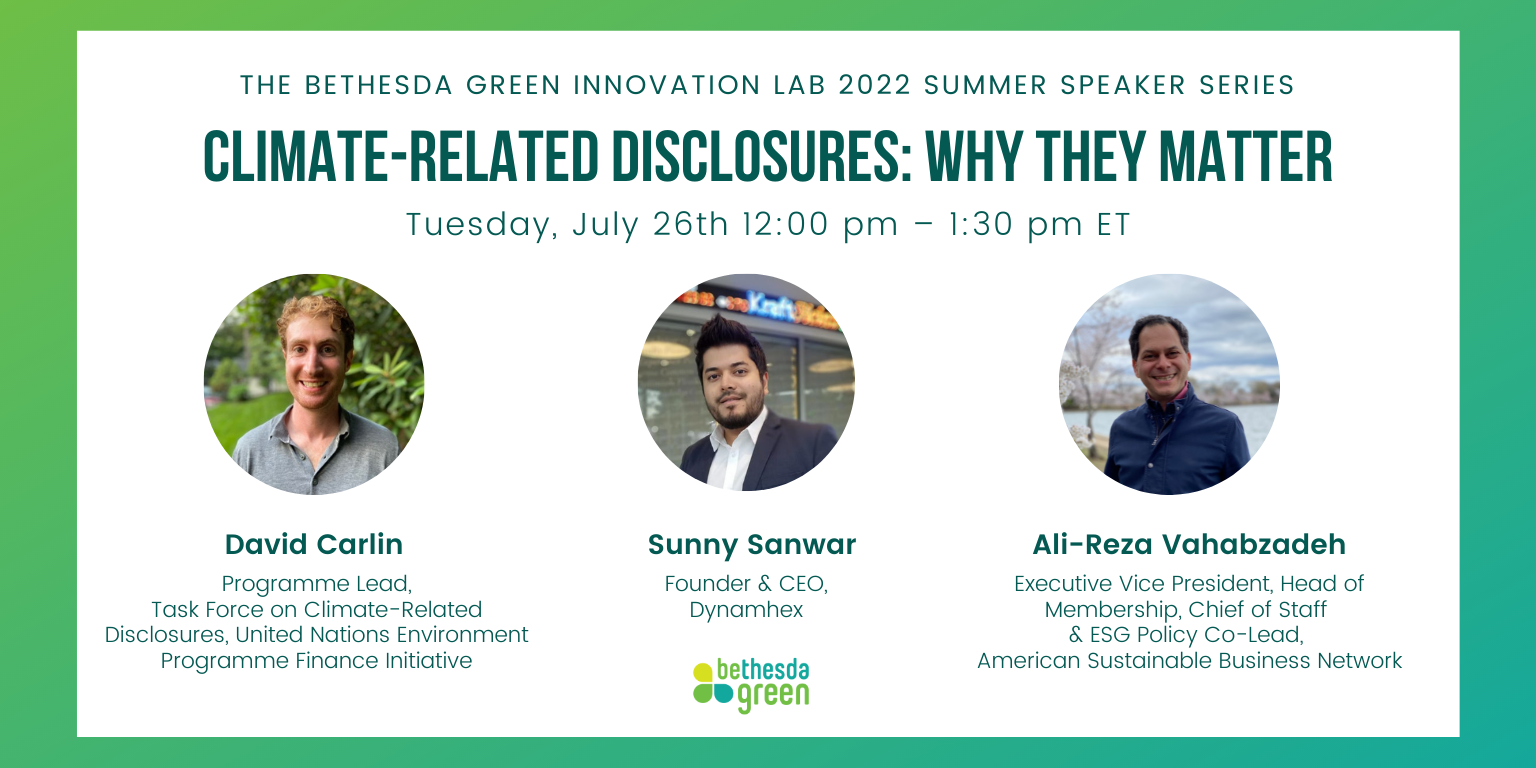2022 Summer Speaker Series: Tackling Environmental Challenges Through Sustainable Entrepreneurship
This summer, Bethesda Green’s Innovation Lab is once again bringing together founders, industry experts, and policy makers for a series of conversations that will inspire and educate all who attend.
During our 2022 Summer Speaker Series, 12 industry experts are coming together to discuss the impact of required climate related financial disclosures, and some of the key challenges and opportunities facing our food system.
The following is a summary of the final session hosted on Tuesday, July 26th. Watch the recording here: https://youtu.be/tQcyk-U5sD8?t=1

Session #1: Climate-Related Disclosures: Why They Matter
Panelists:
- David Carlin: Programme Lead, Task Force on Climate-Related Disclosures, United Nations Environment Programme Finance Initiative
- Ali-Reza Vahabzadeh: Executive Vice President, Head of Membership, Chief of Staff & ESG Policy Co-Lead, American Sustainable Business Network
- Sunny Sanwar: Founder & CEO, Dynamhex
For this conversation, we brought together three industry experts to discuss the importance of the proposed SEC regulation to require climate-related financial disclosures. David Carlin is the Programme Lead, Task Force on Climate-Related Disclosures at the United Nations Environment Programme Finance Initiative. Ali-Reza Vahabzadeh is the Executive Vice President at the American Sustainable Business Network, where he helped to promote and build support for the SEC’s proposal within ASBN’s membership. Sunny Sanwar is the Founder & CEO of Dynamhex, a decarbonization-as-a-software solution to make climate-reporting easier for corporations. Below, please find a collection of some of the key takeaways from this session.
======
Background
The Task Force on Climate-Related Disclosures (TCFD) was created in 2015 by the Financial Stability Board (FSB) to provide consistent and transparent information to global markets about the impact of climate change on an organization’s ability to create value. The importance of this reporting is often misunderstood by corporate leaders and consumers alike, though financial analysts are increasingly learning how to successfully incorporate this data into their risk assessments.
In March, the Securities and Exchange Commission (SEC), the government agency that works to protect investors by ensuring companies provide them with truthful, comprehensive information to allow them to make informed decisions and avoid fraudulent behavior, proposed a rule that would require all public companies to disclose information about their climate-related risks, scope 1, 2, and 3 emissions, and their plans to lower emissions to key stakeholders including investors, consumers, and the public.
The Need for Regulators and Climate Related Disclosures
The proposed SEC rule has led many to question whether we need regulators like the SEC to step in and create rules and legislation to require companies to publish their climate related disclosures. Moreover, if those disclosures are required, should these companies have to follow specific guidelines when reporting information about their company climate risks, emissions, and paths to reduce emissions?
During our discussion with our three speakers who have experience working with businesses and investors, it became clear that we need regulators to require companies to include climate related disclosures into their reports to consumers and investors. Including climate related disclosures would ensure standardization in reporting, curb greenwashing, and ensure transparency surrounding companies’ claims and processes. We need regulators to create rules and regulations to force companies to take the difficult, but necessary steps to become trustworthy, honest companies that consumers want to support.
As one of our panelists, Ali-Reza Vahabzadeh from the American Sustainable Business Network, explained, Generation Z and Millenials are going to be the recipients of the largest wealth transfer in history. The members of our youngest generations are concerned about sustainability, and even factor in sustainability when selecting what businesses to support and what businesses to avoid. According to one survey by Deloitte, approximately 1 in 4 Gen Zers said they “started or deepened their consumer relationships with businesses whose products and services benefit the environment. Conversely, about the same number have stopped or lessened relationships with organizations whose offerings they see as harming the planet ” (Deloitte). The discussion amongst our panelists alongside the Deloitte survey indicate that whether or not the proposed SEC rule is passed, businesses must incorporate climate reporting into their business as more and more consumers want transparency and sustainability from the businesses they support.
Standardization
Prior to any SEC rule being proposed, there were a number of companies like Amazon, Apple, and Netflix that were voluntarily disclosing climate-related reporting. However, inside and across different industries, there was a lack of consistency in the reporting, claimed Dynamhex founder Sunny Sanwar. For example, certain companies would not report Scope 3 emissions, and those who did were not sure what exactly should or should not be reported. One of the SEC’s goals for the proposed rule is to increase standardization in climate reporting. Standardization would allow investors and consumers to trust the claims companies are making, to compare companies with their competitors, and to see where certain companies and industries are falling short.
Explanation of the Levels of Emissions Reporting
In order to create more standardized climate-related disclosures, the SEC provided a clear outline about what emissions should be reported, a topic often enveloped in confusion and inconsistency. One of our panelists, David Carlin from the Task Force on Climate-Related Disclosures created by the United Nations, explained that the proposed SEC rule would require public companies to disclose their Scope 1, 2, and 3 emissions.
Scope 1 emissions are the direct emissions from a company’s operations. An oil company’s scope 1 would be the energy used and emissions produced from the act of drilling, including methane and gas flaring. Scope 2 emissions are indirect operational emissions and may be related to something provided by a supplier. An example of a bank’s scope 2 emissions would include the electricity they use, which may be powered by a coal plant. Although the bank is not burning the coal itself, it is using the energy provided by that coal plant.
Lastly, Scope 3 emissions, which are the most complex and usually the largest share of emissions for most companies, are emissions that result from the end-use of the product the company produces. ExxonMobil, an oil and gas company, extracts and transports oil. The company does not burn the oil themselves to fuel millions of cars, but their scope 3 emissions include the emissions from when the oil they produce and supply is combusted by a car. This car is in ExxonMobil’s value chain and is why people are purchasing ExxonMobil’s products.
Another important aspect of Scope 3 emissions is the inclusion of financed emissions, which are the emissions financial institutions produce through their lending services. For a bank or investment firm, the operational emissions may be quite low. Their scope 1 and 2 emissions only include the emissions produced through the upkeep of their facility and staff, however, the impact of the money these institutions are lending is much larger. As Carlin explains, if a bank is lending large sums of money to open a coal plant or a large carbon-emitting project, this is something that the bank is directly facilitating, so this would be included in their scope 3 emissions.
Greenwashing
Including emissions in climate reporting will also help reduce greenwashing. Greenwashing is when businesses mislead consumers and investors into believing their practices and products are more environmentally safe than they really are. Greenwashing is utilized by many companies as it deceives people into buying or investing in what they believe is a sustainable product or service.
This year, a chief executive of Deutsche bank was found to be misleading investors by exaggerating the green credentials of different possible investments. Nestle is another company with known greenwashing techniques, who claimed their chocolate was “sustainably sourced”, but provided zero evidence to support this claim. Other examples of greenwashing include companies that make glamorous statements about their net-zero goals, but are unable to produce any transition plans on how to fulfill those goals. As Vahabzadeh exclaimed, the proposed SEC rule would reduce greenwashing by reducing companies’ abilities to make inaccurate claims. With increased data and transparency, consumers and investors will have more clarity and consistency surrounding the environmental proceedings of certain companies. This will allow better comparability between competitors and a better understanding of how companies are addressing their climate goals.
Effect of Requiring Climate-Related Disclosures on Companies
The proposed SEC rule would also have many other implications for companies. One major implication would be the need for companies to collect data throughout their value chain. Large corporations work with hundreds of companies every year, and being able to obtain data from all of these sometimes small companies will be a large task.
Although small businesses will not be required to publish any climate-related disclosures, their products and services will be a part of many public companies’ scope 3 emissions. Many small businesses will likely also need to produce data that they might not be used to tracking. Solutions like Dynamhex’s software, which make it easier for companies to collect data from small businesses and fulfill climate reporting requirements, are essential to small businesses because they must be able to properly report their emissions to the larger corporations they serve. If they are unable to provide the required data, those corporations may pivot to sourcing from a different business that will be able to provide the data they need to fulfill SEC requirements.
Reporting Issues Faced by Companies
Completing these climate related disclosures will not be an easy task for large corporations. According to Forbes, only 20% of public companies in the US voluntarily report their emissions right now. If the proposed SEC rule is passed, the other 80% of companies will need to tackle reporting their climate risks, emissions, and transition plans. As David Carlin explains, there are three main issues companies face when conducting climate-related disclosure reporting.
The first issue companies face is a skill-based deficit. Doing scenario analysis and quantifying climate risks is asking companies to use skills and funds most companies do not currently have on hand. Companies must allocate more resources to hire people and put into place processes that will allow them to accurately report climate-related aspects of their business.
To accurately report the different parts of a climate-related disclosure, companies must collect the necessary data from within their own company and from other companies that assist their company’s operations. Institutions must form partnerships and processes to collect data they need for their climate reporting.
Lastly, across different industries and countries, there is inconsistency within the requirements that companies must follow when reporting their climate disclosures. In many countries, such as the US right now, there is no requirement to publish climate reporting. Because of this, consumers and investors look at who is disclosing versus who is not, when instead it should be a comparison between different actor’s climate metrics reported in their disclosures. This is an issue that the SEC is trying to solve with their proposed rule on requiring climate-related disclosures for all public companies in the US.
What Should be Done with Climate Disclosures
Including climate-related disclosures in their financial reporting will be a sizable investment for companies. However, these disclosures will allow companies to form better relationships with their customers and investors and can also be a tool for reflection and change for the company when used properly.
As Carlin stressed, disclosures that are just a reporting exercise are not going to be useful in creating the transformative change we need. Disclosures must become another piece of information in a similar way that financial reporting is used by analysts to make important decisions about company viability and potential financial decisions. These are the places this information belongs and needs to be included. Companies must derive action from these disclosures in order to make markets work better and make climate a more central theme in the discussion of risk and opportunities. The rest of the panel echoed that real change is derived from the climate-related disclosures actually being used by the organization to look towards the future and when making decisions.
Key Takeaways
Climate-related disclosures matter because they allow investors and consumers to make informed decisions about the companies they support. To allow stakeholders to make well-informed decisions, these disclosures require standardization. The proposed SEC rule will increase standardization in reporting. Standardization will allow for the comparability and clarity that will protect investors and customers when making decisions. However, the climate-related disclosures should not solely be used as a reporting exercise for stakeholders. They must be spread throughout a company to make sure that the information included in reporting is used when making decisions in the company in the same way other risk reports are utilized. Climate related disclosures will require investment from companies and cooperation from smaller and private companies that are not required to disclose climate related information, but these disclosures can be a great tool for companies, investors, and consumers.
 Aasritha Sanikommu, Innovation Lab 2022 Impact Intern
Aasritha Sanikommu, Innovation Lab 2022 Impact Intern
Aasritha is originally from Pennsylvania and is now a student at the University of Maryland. She is studying Computer Science and is pursuing a Business Analytics minor. She is also very interested in entrepreneurship and sustainability, and hopes to expand these passions as an intern at Bethesda Green!





